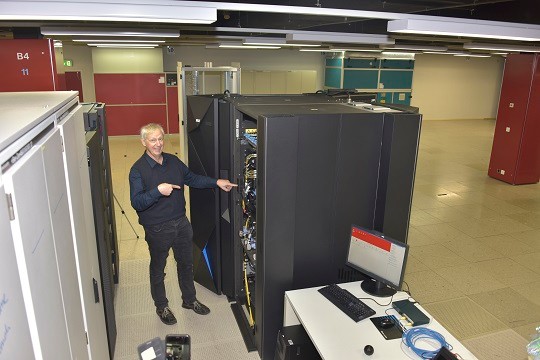Mainframe as a Service
The mainframe has moved into the cloud
Swisscom has migrated its entire mainframe workload into the cloud. But it took a long time before Team Leader Werner Pfäffli could press the “off” button. A review of a historical project.
Text: Nina Fehr, 16 may 2019
Werner Pfäffli remembers the old times well – even the systems that once used punch cards. You might think that Werner was at Swisscom forever. After all, he worked for the company for more than 38 years. And as Team Leader Mainframe Base Services, he accompanied the development and change of the host environment. On 9 March, he was finally able to press the “off” button.

Walter Pfäffli, former Team Leader Mainframe Base Services, switches the mainframe off after more than 35 years of operation.
With this migration, Swisscom has reached a milestone in corporate IT by moving business-critical mainframe applications and data into its own enterprise cloud infrastructure without recompiling the applications or reformatting data. This new solution saves Swisscom about half of its regular mainframe operating costs. The migrated business-critical applications – measured at 2500 installed MIPS (million instructions per second) – manage billing, geographical and address information as well as line administration for the entire Swisscom fixed network.

Walter Pfäffli, former Team Leader Mainframe Base Services, at the mainframe more than 35 years ago.
Project duration: One year became about two-and-a-half
This pleasing result was the outcome of a truly mammoth task. Back in 2009, Swisscom planned to shut its mainframe down by mid-2011. But all the deadlines came and went without a “power off” – quite the contrary. It would take another five years until the issue became more concrete again. In 2016, Swisscom again gave serious thought to how the mainframe applications could be replaced. On the one hand, it was about cutting costs. On the other, fewer and fewer employees had the necessary know-how to support host environments.
Swisscom had been talking to LzLabs since 2015 in its search for solutions. The entire project then lasted two-and-a-half years, with constant ups and downs, setbacks and minor successes. “At first we very much doubted whether this would actually work,” says Werner Pfäffli. The project drained a lot of energy and resources, but someone on the team always “yanked at the reins” and things started moving again. Belief in the solution was extremely important. And yet Werner Pfäffli is certain: “If we had known at the outset that it would take us two-and-a-half years to get a working solution, the project would never have got off the ground.” However, as the phrase goes, good things take time.
A global novelty: MaaS for Swisscom customers
The new solution is not only a world premiere for Swisscom, but also for the market. And it gives Swisscom an opportunity to offer its customers mainframe as a service (MaaS); a solution with enormous market potential. After all, a study conducted by Microsoft and LzLabs found that 94% of IT decision-makers polled in the US, Canada, France and Germany are considering replacing their mainframes. Indeed, 77% of the respondents think their company should have started migrating long ago in order to minimise risks such as resource depletion, high costs and a lack of flexibility. Werner Pfäffli will be able to observe the developments in a relaxed manner. He recently retired.
Mainframe from the cloud
Swisscom now offers companies the re-hosting of mainframe applications in the Swisscom Enterprise Service Cloud (x86). In this, Swisscom acts as an integrator and operator: analysing, planning and migrating native mainframe applications into the cloud using four transformation modules and based on open source solutions. After the migration, customers can count on a comparable performance and stability as before – but it will be much more flexible, cost-effective and modern.

Newsletter
Would you like to regularly receive interesting articles and whitepapers on current ICT topics?
More on the topic


